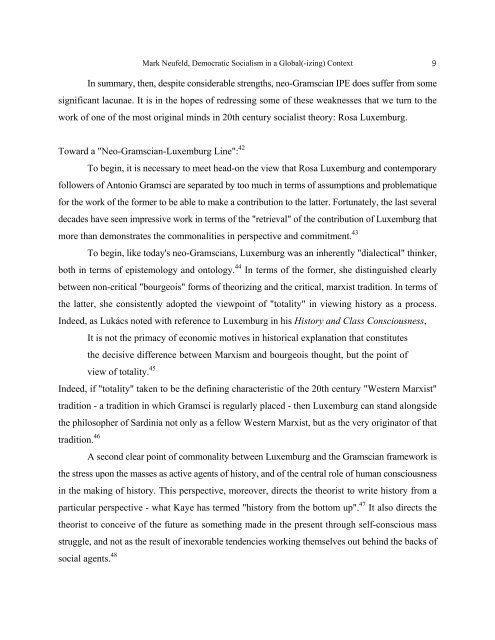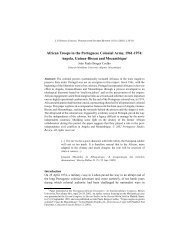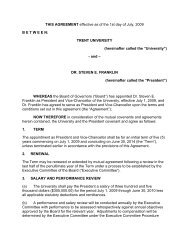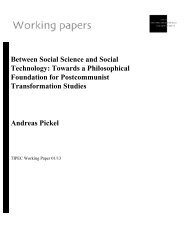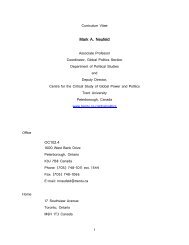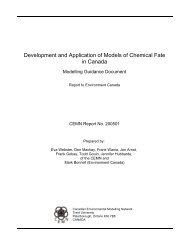Mark Neufeld, Democratic Socialism in a Global ... - Trent University
Mark Neufeld, Democratic Socialism in a Global ... - Trent University
Mark Neufeld, Democratic Socialism in a Global ... - Trent University
Create successful ePaper yourself
Turn your PDF publications into a flip-book with our unique Google optimized e-Paper software.
<strong>Mark</strong> <strong>Neufeld</strong>, <strong>Democratic</strong> <strong>Socialism</strong> <strong>in</strong> a <strong>Global</strong>(-iz<strong>in</strong>g) Context 9<br />
In summary, then, despite considerable strengths, neo-Gramscian IPE does suffer from some<br />
significant lacunae. It is <strong>in</strong> the hopes of redress<strong>in</strong>g some of these weaknesses that we turn to the<br />
work of one of the most orig<strong>in</strong>al m<strong>in</strong>ds <strong>in</strong> 20th century socialist theory: Rosa Luxemburg.<br />
Toward a "Neo-Gramscian-Luxemburg L<strong>in</strong>e": 42<br />
To beg<strong>in</strong>, it is necessary to meet head-on the view that Rosa Luxemburg and contemporary<br />
followers of Antonio Gramsci are separated by too much <strong>in</strong> terms of assumptions and problematique<br />
for the work of the former to be able to make a contribution to the latter. Fortunately, the last several<br />
decades have seen impressive work <strong>in</strong> terms of the "retrieval" of the contribution of Luxemburg that<br />
more than demonstrates the commonalities <strong>in</strong> perspective and commitment. 43<br />
To beg<strong>in</strong>, like today's neo-Gramscians, Luxemburg was an <strong>in</strong>herently "dialectical" th<strong>in</strong>ker,<br />
both <strong>in</strong> terms of epistemology and ontology. 44 In terms of the former, she dist<strong>in</strong>guished clearly<br />
between non-critical "bourgeois" forms of theoriz<strong>in</strong>g and the critical, marxist tradition. In terms of<br />
the latter, she consistently adopted the viewpo<strong>in</strong>t of "totality" <strong>in</strong> view<strong>in</strong>g history as a process.<br />
Indeed, as Lukács noted with reference to Luxemburg <strong>in</strong> his History and Class Consciousness,<br />
It is not the primacy of economic motives <strong>in</strong> historical explanation that constitutes<br />
the decisive difference between Marxism and bourgeois thought, but the po<strong>in</strong>t of<br />
view of totality. 45<br />
Indeed, if "totality" taken to be the def<strong>in</strong><strong>in</strong>g characteristic of the 20th century "Western Marxist"<br />
tradition - a tradition <strong>in</strong> which Gramsci is regularly placed - then Luxemburg can stand alongside<br />
the philosopher of Sard<strong>in</strong>ia not only as a fellow Western Marxist, but as the very orig<strong>in</strong>ator of that<br />
tradition. 46<br />
A second clear po<strong>in</strong>t of commonality between Luxemburg and the Gramscian framework is<br />
the stress upon the masses as active agents of history, and of the central role of human consciousness<br />
<strong>in</strong> the mak<strong>in</strong>g of history. This perspective, moreover, directs the theorist to write history from a<br />
particular perspective - what Kaye has termed "history from the bottom up". 47 It also directs the<br />
theorist to conceive of the future as someth<strong>in</strong>g made <strong>in</strong> the present through self-conscious mass<br />
struggle, and not as the result of <strong>in</strong>exorable tendencies work<strong>in</strong>g themselves out beh<strong>in</strong>d the backs of<br />
social agents. 48


